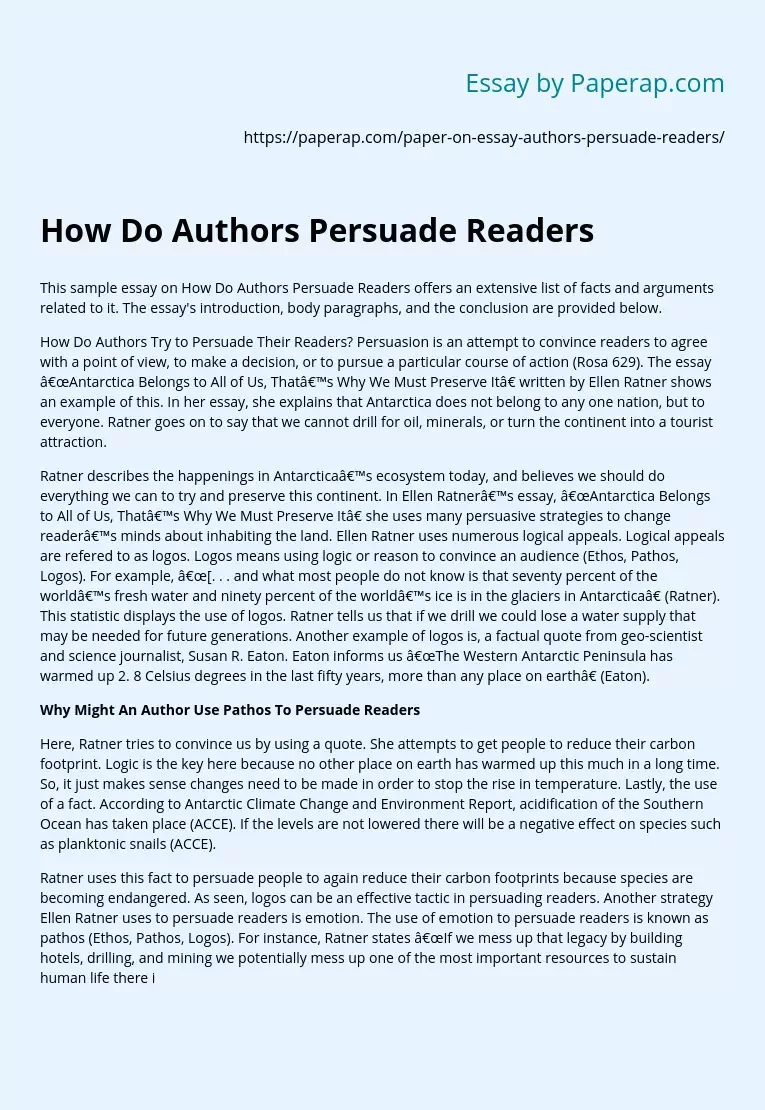How Do Authors Try to Persuade Their Readers?
Ratner describes the happenings in Antarctica’s ecosystem today, and believes we should do everything we can to try and preserve this continent. In Ellen Ratner’s essay, “Antarctica Belongs to All of Us, That’s Why We Must Preserve It” she uses many persuasive strategies to change reader’s minds about inhabiting the land. Ellen Ratner uses numerous logical appeals. Logical appeals are refered to as logos. Logos means using logic or reason to convince an audience (Ethos, Pathos, Logos).
For example, “and what most people do not know is that seventy percent of the world’s fresh water and ninety percent of the world’s ice is in the glaciers in Antarctica” (Ratner).
This statistic displays the use of logos. Ratner tells us that if we drill we could lose a water supply that may be needed for future generations. Another example of logos is, a factual quote from geo-scientist and science journalist, Susan R. Eaton. Eaton informs us “The Western Antarctic Peninsula has warmed up 2.
8 Celsius degrees in the last fifty years, more than any place on earth” (Eaton).
Here, Ratner tries to convince us by using a quote. She attempts to get people to reduce their carbon footprint. Logic is the key here because no other place on earth has warmed up this much in a long time. So, it just makes sense changes need to be made in order to stop the rise in temperature. Lastly, the use of a fact. According to Antarctic Climate Change and Environment Report, acidification of the Southern Ocean has taken place (ACCE).
If the levels are not lowered there will be a negative effect on species such as planktonic snails (ACCE).
Ratner uses this fact to persuade people to again reduce their carbon footprints because species are becoming endangered. As seen, logos can be an effective tactic in persuading readers. Another strategy Ellen Ratner uses to persuade readers is emotion. The use of emotion to persuade readers is known as pathos (Ethos, Pathos, Logos). For instance, Ratner states “If we mess up that legacy by building hotels, drilling, and mining we potentially mess up one of the most important resources to sustain human life there is” (Ratner).
This quote is an example of pathos because she tries to make readers feel scared. Ratner does this by saying if we do these things in Antarctica, then we are contributing to the end of human life. An additional use of pathos occurs when Ratner mentions in her essay “It used to snow and not rain, but due to climate change there is rain in Antarctica flooding rookeries and even giving some penguins hypothermia” (Ratner). Here, pathos is found because it makes readers feel bad for the penguins. Nobody wants to see a cute little penguin get sick.
Lastly, the word “Antarctica” conveys emotion. The word suggests images of penguins waddling around, which brings people to feel happy, or delightful. Each of these examples demonstrates how Ratner tries to compel her readers. Ellen Ratner uses ethical appeals as well to persuade her readers. This appeal possesses the name ethos. Ethos is the means to convince an audience of the author’s credibility or character (Ethos, Pathos, Logos). A display of ethos in Ratner’s essay would be the opportunity she received from explorer Robert Swan to travel to Antarctica.
This opportunity Ratner received gives her credibility because she has actually traveled to Antarctica. Knowing this information gives people faith that she knows what she is talking about. Another example of this strategy is through her knowledge of the history of Antarctica. She shares information with her readers when she says, “there is no government here other than an agreement reached from the treaty known as the Madrid Protocol enacted in 1991. It means there can be no petroleum or mineral exploration and no hotels or ski slopes for tourism” (Ratner).
The final exhibit of ethos shown in this essay is again from the quote “If we mess up that legacy by building hotels, drilling, and mining we potentially mess up one of the most important resources to sustain human life there is” (Ratner). Here, Ratner uses ethics to persuade readers basically by saying if any of these actions are performed human life will come to an end. Ethos is another widely used tactic authors use to persuade readers. The use of connotative words is another technique Ellen Ratner uses. Connotative words are words that have acquired associations or emotional overtones (Rosa 273).
For example, “Antarctica” is not only an example of pathos, but a connotative word as well. “Antarctica” is connotative because it connotes cold, wild, penguins, snow, ice, and many other images than just a continent. In the sentence, “What jolted me is how fragile the ecosystem is” (Ratner), “fragile” is a connotative word. The ecosystem is not usually associated with this word. When a person thinks of something being fragile they usually think of china plates, or glassware. Finally, the word “hunting” is a connotative word as well.
This word connotes the outdoors, animals, guns, and plenty more than just hunting alone. Using connotative words is a manner in which Ratner can try to persuade readers. Authors have many different ways they try to persuade their readers of the point they are trying to get across. Logos, ethos, pathos, and connotative words are some of the techniques Ellen Ratner used in her essay “Antarctica Belongs to All of Us, That’s Why We Must Preserve It”. She used these different techniques to try and convince us that antarctica should be left alone and uninhabited.
How Do Authors Try to Persuade Their Readers?. (2019, Dec 06). Retrieved from https://paperap.com/paper-on-essay-authors-persuade-readers/

